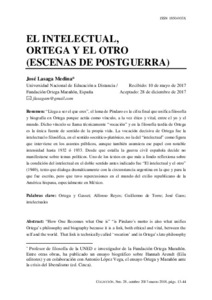Por favor, use este identificador para citar o enlazar este ítem:
https://repositorio.uca.edu.ar/handle/123456789/7105| Campo DC | Valor | Lengua/Idioma |
|---|---|---|
| dc.contributor.author | Lasaga Medina, José | es |
| dc.date.accessioned | 2019-06-19T23:55:19Z | - |
| dc.date.available | 2019-06-19T23:55:19Z | - |
| dc.date.issued | 2018 | - |
| dc.identifier.citation | Lasaga Medina, J. El intelectual Ortega y el otro : escenas de postguerra [en linea]. Colección. 2018, 23(28). Disponible en: https://repositorio.uca.edu.ar/handle/123456789/7105 | es |
| dc.identifier.issn | 1850-003X (en línea) | - |
| dc.identifier.issn | 0328-7998 (impreso) | - |
| dc.identifier.uri | https://repositorio.uca.edu.ar/handle/123456789/7105 | - |
| dc.description.abstract | Resumen: “Llega a ser el que eres”, el lema de Píndaro es la cifra final que unifica filosofía y biografía en Ortega porque actúa como vínculo, a la vez ético y vital, entre el yo y el mundo. Dicho vínculo se llama técnicamente “vocación” y en la filosofía tardía de Ortega es la única fuente de sentido de la propia vida. La vocación decisiva de Ortega fue la intelectual o filosófica, en el sentido socrático-platónico, no la del “intelectual” como figura que interviene en los asuntos públicos, aunque también asumiera ese papel con notable intensidad hasta 1932 ó 1933. Desde que estalla la guerra civil española decide no manifestarse sobre temas políticos. Uno de los textos en que más a fondo reflexiona sobre la condición del intelectual en el doble sentido antes indicado fue “El intelectual y el otro” (1940), texto que dialoga dramáticamente con la circunstancia argentina en la que y para la que fue escrito, pero que tuvo repercusiones en el mundo del exilio republicano de la América hispana, especialmente en México. | es |
| dc.description.abstract | Abstract: “How One Becomes what One is” “is Pindaro’s motto is also what unifies Ortega’s philosophy and biography because it is a link, both ethical and vital, between the self and the world. That link is technically called ‘vocation’ and in Ortega’s late philosophyit is the only source of meaning for one’s life. Ortega’s most decisive vocation was of an intellectual-philosopher, in the Socratic-Platonic sense, not of the intellectual as a figure that intervenes in the public sphere, even if he did take on that role with great intensity until 1932-33. Since the outbreak of the Spanish Civil War he decided not to take a public stance in political matters. One of the texts where he reflects deeply about the condition of the intellectual in the roles mentioned above is “El intelectual y el otro” (1940), a text where he establishes a dialogue with circumstances in Argentina for which the text was written, and which had great repercussions in the world of the Republican exiles living in Hispanic America, especially in Mexico. | es |
| dc.format | application/pdf | es |
| dc.language.iso | spa | es |
| dc.publisher | Pontificia Universidad Católica Argentina. Facultad de Ciencias Sociales. Departamente de Ciencias Políticas y Relaciones Internacionales | es |
| dc.rights | Acceso Abierto | es |
| dc.rights.uri | https://creativecommons.org/licenses/by-nc-sa/4.0/ | es |
| dc.source | Colección. 2018, 23(28) | es |
| dc.subject | POLITICA | es |
| dc.subject | INTELECTUALES | es |
| dc.subject | Ortega y Gasset, José, 1883-1955 | es |
| dc.subject | FILOSOFIA | es |
| dc.title | El intelectual, Ortega y el otro : escenas de postguerra | es |
| dc.type | Artículo | es |
| uca.path | Colección|2018 Año XXIII nº 28 | es |
| uca.disciplina | CIENCIA POLITICA | es |
| uca.filename | /home/data-uca-generic/folder_revistas/Revistas varias/coleccion/coleccion28/intelectual-ortega-otro-escenas/metadata.xml | es |
| uca.issnrd | 1 | es |
| uca.affiliation | Fil: Lasaga Medina, José. Universidad Nacional de Educación a Distancia; España | es |
| uca.affiliation | Fil: Lasaga Medina, José. Fundación Ortega Marañón; España | es |
| uca.orden | 01 | es |
| uca.version | publishedVersion | es |
| item.languageiso639-1 | es | - |
| item.fulltext | With Fulltext | - |
| item.grantfulltext | open | - |
| Aparece en las colecciones: | COL - 2018 Año XXIII nro. 28 | |
Ficheros en este ítem:
| Fichero | Descripción | Tamaño | Formato | |
|---|---|---|---|---|
| 1031-3521-1-PB.pdf | 255,41 kB | Adobe PDF |  Visualizar/Abrir |
Visualizaciones de página(s)
121
comprobado en 30-abr-2024
Descarga(s)
133
comprobado en 30-abr-2024
Google ScholarTM
Ver en Google Scholar
Este ítem está sujeto a una Licencia Creative Commons

